- Clone
- A1 (See other available formats)
- Regulatory Status
- RUO
- Workshop
- HCDM listed
- Other Names
- gp80, E-ATPDase, NTPDase-1, ecto-apyrase, Ec3.6.1.5
- Isotype
- Mouse IgG1, κ
- Ave. Rating
- Submit a Review
- Product Citations
- publications
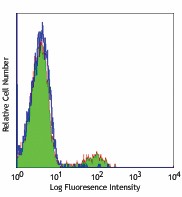
-

Human peripheral blood lymphocytes stained with purified A1, followed by anti-mouse IgG FITC
Human CD39 is an integral membrane protein with two transmembrane domains. It exists as a homotetramer. Expression of CD39 is found on activated lymphocytes, a subset of T cells and B cells, and dendritic cells with weak staining on monocytes and granulocytes. CD39 and CD73 have been found on regulatory T cells, specifically the effector/memory like T cells. CD39 can hydrolyze both nucleoside triphosphates and diphosphates. CD39 is the dominant ecto nucleotidase of vascular and placental trophoblastic tissues and appears to modulate the functional expression of type 2 purinergic (P2) G protein coupled receptors (GPCRs). CD39 has intrinsic ecto-ATPase activity. Expression of CD39 is induced on T cells and increased on B cells as a late activation antigen.
Product DetailsProduct Details
- Verified Reactivity
- Human, Cynomolgus, Rhesus
- Antibody Type
- Monoclonal
- Host Species
- Mouse
- Immunogen
- PHA activated human lymphocytes
- Formulation
- Phosphate-buffered solution, pH 7.2, containing 0.09% sodium azide.
- Preparation
- The antibody was purified by affinity chromatography.
- Concentration
- 0.5 mg/ml
- Storage & Handling
- The antibody solution should be stored undiluted between 2°C and 8°C.
- Application
-
FC - Quality tested
IHC-P, Block - Reported in the literature, not verified in house - Recommended Usage
-
Each lot of this antibody is quality control tested by immunofluorescent staining with flow cytometric analysis. For flow cytometric staining, the suggested use of this reagent is ≤ 1.0 µg per 106 cells in 100 µl volume or 100 µl of whole blood. It is recommended that the reagent be titrated for optimal performance for each application.
- Application Notes
-
The A1 antibody binds to the human CD39 cell surface antigen and has been shown to block MHC independent target cell recognition by hapten-specific CTL. Additional reported applications (for the relevant formats) include: in vitro CD39 blockade3, immunofluorescence4, immunohistochemistry6, and spatial biology (IBEX)7,8. The Ultra-LEAF™ purified antibody (Endotoxin < 0.01 EU/µg, Azide-Free, 0.2 µm filtered) is recommended for blocking assays (contact our custom solutions team).
-
Application References
(PubMed link indicates BioLegend citation) -
- Aversa GG, et al. 1988. Transplant. P. 20:4952.
- Aversa GG, et al. 1989. Transplant. P. 21:34950.
- Borsellino G, et al. 2007. Blood. 110:1225. (Block)
- Stockl J, et al. 2001. J. Immunol. 167:2724. (IF)
- Sestak K, et al. 2007. Vet. Immunol. Immunopathol. 119:21.
- Lyck L, et al. 2008. J. Histochem. Cytochem. 56:201. (IHC)
- Radtke AJ, et al. 2020. Proc Natl Acad Sci USA. 117:33455-33465. (SB) PubMed
- Radtke AJ, et al. 2022. Nat Protoc. 17:378-401. (SB) PubMed
- Product Citations
-
- RRID
-
AB_940438 (BioLegend Cat. No. 328202)
Antigen Details
- Distribution
-
Activated lymphocytes, and also on a subset of T cells, regulatory T cells, B cells, and dendritic cells.
- Cell Type
- B cells, Dendritic cells, Lymphocytes, T cells, Tregs
- Biology Area
- Immunology
- Molecular Family
- CD Molecules
- Gene ID
- 953 View all products for this Gene ID
- UniProt
- View information about CD39 on UniProt.org
Related FAQs
Other Formats
View All CD39 Reagents Request Custom ConjugationCustomers Also Purchased
Compare Data Across All Formats
This data display is provided for general comparisons between formats.
Your actual data may vary due to variations in samples, target cells, instruments and their settings, staining conditions, and other factors.
If you need assistance with selecting the best format contact our expert technical support team.
-
Brilliant Violet 510™ anti-human CD39
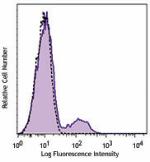
Human peripheral blood lymphocytes were stained with CD39 (c... -
Brilliant Violet 421™ anti-human CD39
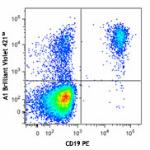
Human peripheral blood lymphocytes were stained with CD19 PE... 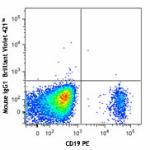
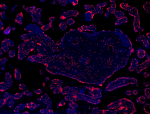
Human paraffin-embedded placenta tissue slice was prepared w... -
Purified anti-human CD39
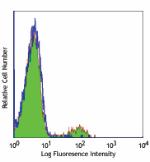
Human peripheral blood lymphocytes stained with purified A1,... -
Biotin anti-human CD39
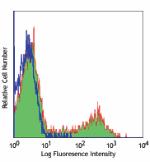
Human peripheral blood lymphocytes stained with biotinylated... -
FITC anti-human CD39
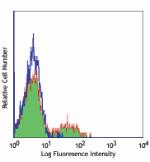
Human peripheral blood lymphocytes stained with A1 FITC -
PE anti-human CD39
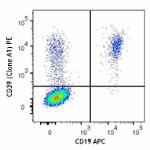
Human peripheral blood lymphocytes were stained with CD19 AP... 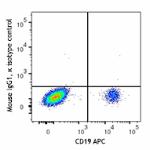
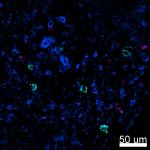
Confocal image of human lymph node sample acquired using the... -
APC anti-human CD39
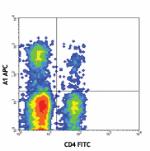
Human peripheral blood lymphocytes were stained with anti-hu... 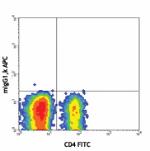
-
PE/Cyanine7 anti-human CD39
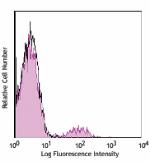
Human peripheral blood lymphocytes stained with A1 PE/Cyanin... 
Human peripheral blood lymphocytes were stained with anti-hu... -
PerCP/Cyanine5.5 anti-human CD39
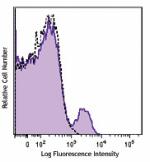
Human peripheral blood lymphocytes were stained with CD39 (c... -
Purified anti-human CD39 (Maxpar® Ready)
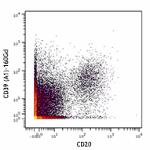
Human PBMCs stained with 147Sm-anti-CD20 (2H7) and 160Gd-ant... 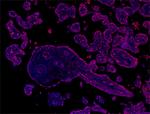
Human paraffin-embedded placenta tissue slice was stained wi... -
PE/Dazzle™ 594 anti-human CD39
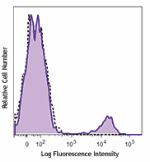
Human peripheral blood lymphocytes were stained with CD39 (c... -
APC/Cyanine7 anti-human CD39

Human peripheral blood lymphocytes were stained with CD19 FI... -
Brilliant Violet 711™ anti-human CD39
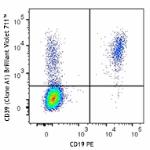
Human peripheral blood lymphocytes were stained with CD19 PE... 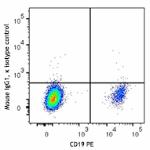
-
APC/Fire™ 750 anti-human CD39
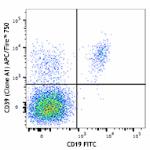
Human peripheral blood lymphocytes were stained with CD19 FI... 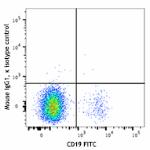
-
Alexa Fluor® 594 anti-human CD39
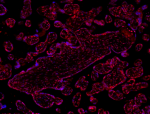
Human paraffin-embedded placenta tissue slice was prepared w... -
TotalSeq™-A0176 anti-human CD39
-
Brilliant Violet 605™ anti-human CD39

Human peripheral blood lymphocytes were stained with CD19 Al... -
TotalSeq™-C0176 anti-human CD39
-
Brilliant Violet 785™ anti-human CD39

Human peripheral blood lymphocytes were stained with CD19 Pa... -
TotalSeq™-B0176 anti-human CD39
-
TotalSeq™-D0176 anti-human CD39
-
PE/Fire™ 810 anti-human CD39 Antibody

Human peripheral blood lymphocytes were stained with anti-hu... -
PE/Cyanine5 anti-human CD39

Human peripheral blood lymphocytes were stained with anti-hu... -
PerCP/Fire™ 806 anti-human CD39

Human peripheral blood lymphocytes were stained with anti-hu... -
Spark NIR™ 685 anti-human CD39

Human peripheral blood lymphocytes were stained with anti-hu... -
Spark Red™ 718 anti-human CD39 (Flexi-Fluor™)
-
PE/Fire™ 744 anti-human CD39

Human peripheral blood lymphocytes were stained with anti-hu... -
Alexa Fluor® 700 anti-human CD39

Human peripheral blood lymphocytes were stained with anti-hu... -
Spark Blue™ 574 anti-human CD39 (Flexi-Fluor™)
-
Spark Blue™ 550 anti-human CD39 (Flexi-Fluor™)
-
Alexa Fluor® 647 anti-human CD39

Human peripheral blood lymphocytes were stained with anti-hu... 
IHC staining of Alexa Fluor® 647 anti-human CD39 (clone A1) ... -
Spark PLUS UV395™ anti-human CD39

Human peripheral blood lymphocytes were stained with anti-hu...





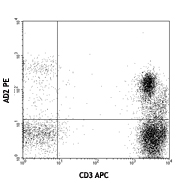
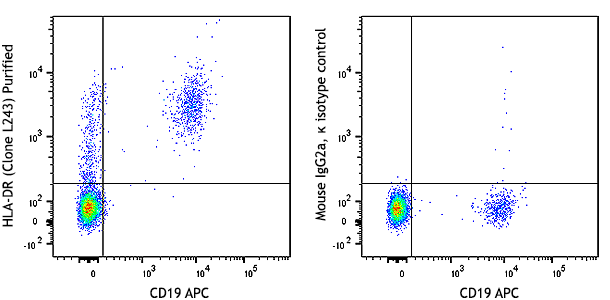
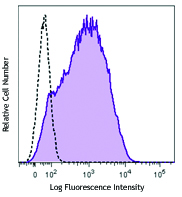




Follow Us